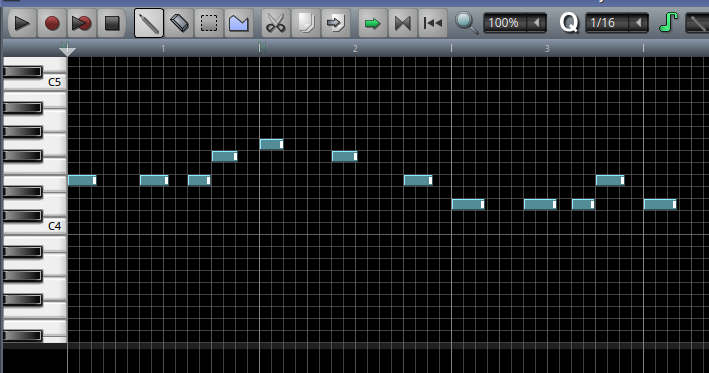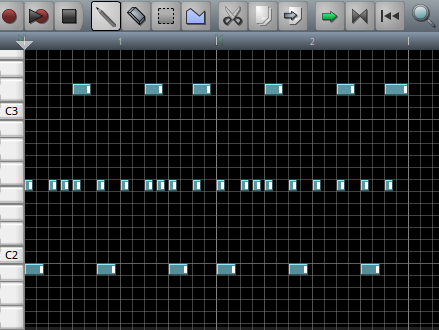Other file formats
This tool works for music "construction" file types.
The nice thing about Amiga Music trackers was that you did not so much record the complete music as that you assembled it, using samples that were played at various speeds (to simulate difference in pitch), building patterns containing the timing moments at which a certain sample was to be triggered at a certain pitch and then also defining when various patterns would be played. You also had the possibility to administer effects, but I never used that - which is also the reason this tool doesn't support them.
Although mod was kind of the original format on the Amiga, I actually preferred making music in MED (later OctaMED), which had a nicer interface in my opinion and also the possibility to enter pattern and file descriptions. When I moved to the PC I had to switch to mods because I hadn't discovered yet that MED had been ported also.
I also dabbled a bit with a new type of format some trackers offered (eXtended Module) which had the possibility to use instruments made up of multiple samples but I think I found this too complicated for my use.
I also discovered another type of music construction: MIDI, which used a built-in set of instruments. While trackers used a vertical interface showing all tracks side by side, MIDI editors often used a horizontal "piano-roll" interface showing only one track at a time, but visualising pitch as well as timing.

As a bonus, MIDI makes it possible to combine percussion instruments into a single track instead of either having to play them in separate tracks (as shown in the first image, tracks 1 and 2) or not being able to play them at the same time, or needing to make samples consisting of some drum instruments played simultaneously.

(you can see my preference for these types of interfaces show through in the formatting of the output files)
Simple MIDI editors however did not offer the possiblity to define blocks of music to be played at various times, making it possible to define something once and then repeat it whenever needed. You had to create the entire music piece as one long track of events.
So I switched to sequencing / arranging software. Unfortunately, these are generally too complicated for my taste. Also, practically every one of these used its own file format so you can't properly exchange or compare files between them.
This tool somewhat brings it all together in that universal and simplest of formats: plain text. It's still not suitable for exchanging, but perfect for comparison and that's what I intended it for.
All in all, I found it necessary to have this tool catering for the following formats, which it "detects" based upon the file extension:
med
mod
xm (an extension of the MOD format, with more control over the instrument parameters)
midi
rpp (a format used by Reaper, a sequencer I used for a brief while on Windows)
mmpz (format used by LMMS, which I switched to when I moved to Linux)
To make them all produce output formatted the same way I took the module format philosophy of a playlist showing repeating patterns and took it a step further by breaking up the music data into patterns and playlists for each separate instrument, counting a complete drumkit as one instrument.
However, printing it all as a continuous timeline is also possible.